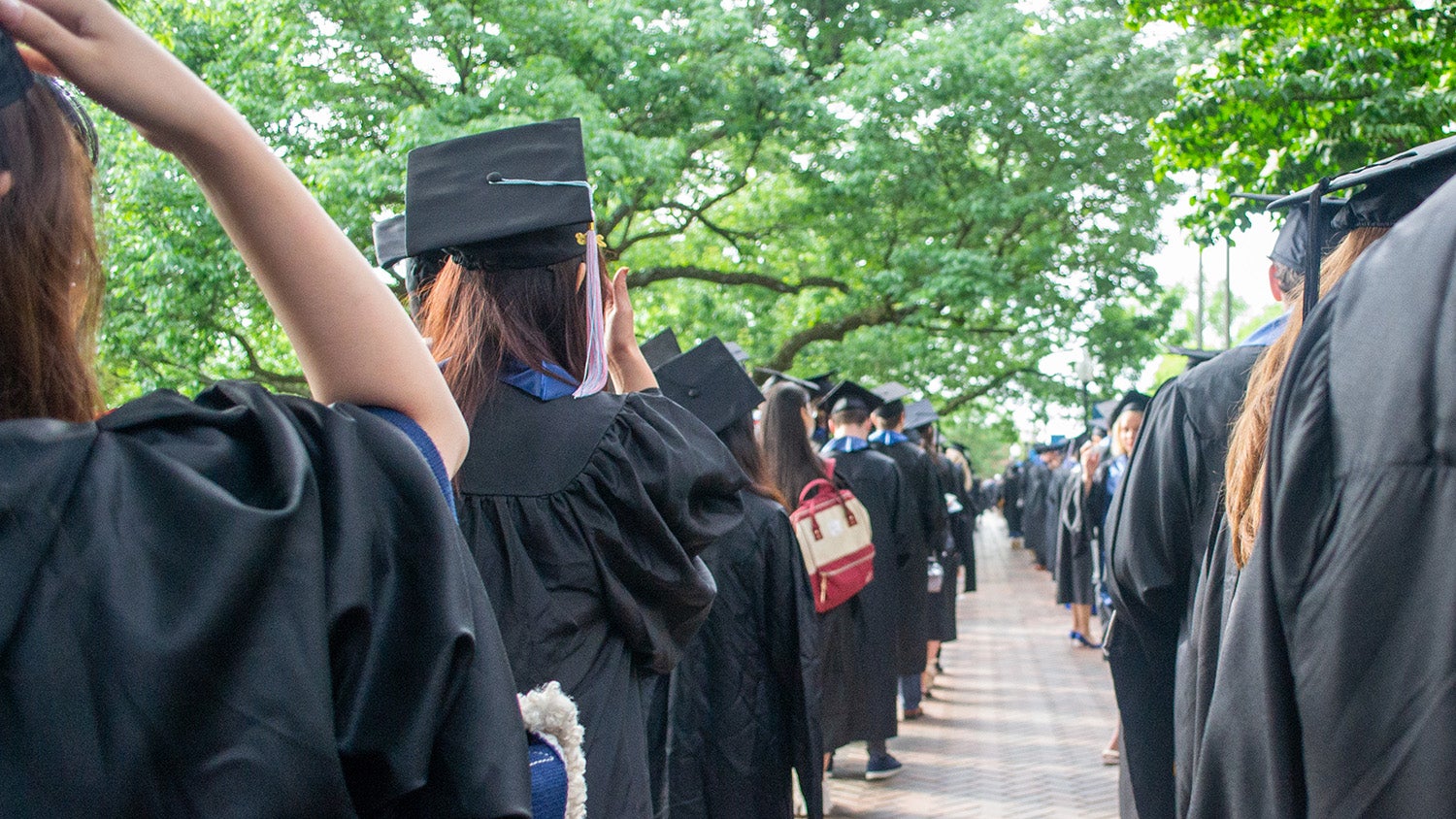Bringing the World to Georgetown: International Students in BGE’s Class of 2024
By Natalie Rabner, Elizabeth Salm and Vaughn Samuel
Each Biomedical Graduate Education student brings a unique background to our academic community. The diversity of the BGE community is invaluable, empowering our scholars to learn from one another and graduate with new perspectives as well as skills.
The experiences of our international students exemplify the power of diversity. International students come to the United States and Georgetown carrying a world of experiences, ideas and dreams. They overcome distinct challenges, from visa hurdles to language barriers and adjusting to a new culture as they take on their coursework. Through it all, they display a drive to succeed in their studies and in their careers.
The BGE Class of 2023-24 includes 100 international students from 32 countries. As you read the profiles below, you’ll get to know several of our graduating international students – their backgrounds, their motivations, and how they’ve made the most of their time at Georgetown as they pursue their goals. We hope their stories will inspire you to persevere in your pursuits and make an impact in the world!
Katherine Chavez Carpio
Special Master’s Program in Physiology
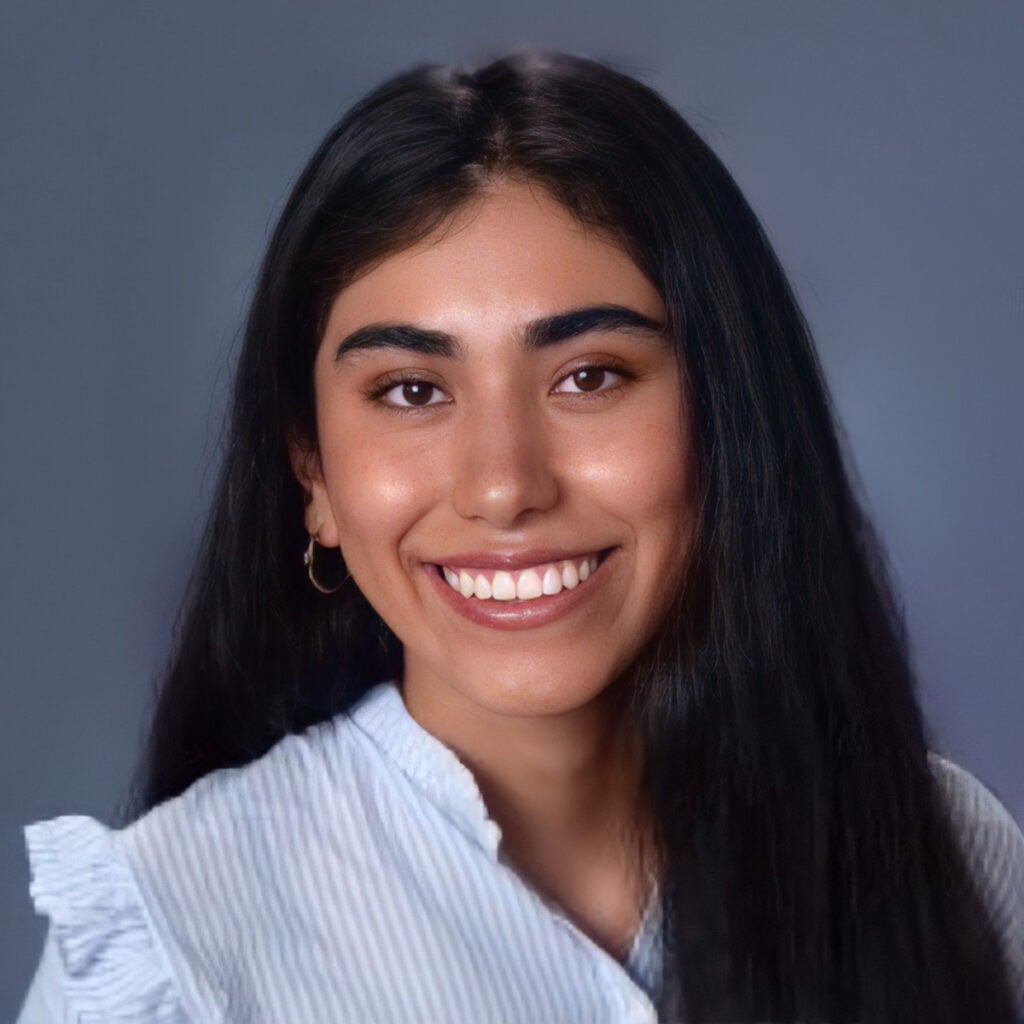
Since growing up in Arequipa, Peru, Katherine has sought to make a difference in the wellbeing of those around her.
In Peru, she volunteered in clinics with Catholic Charities. As an undergrad at the University of Maryland, she worked with the Red Cross and went to EMT classes so she could serve with the Chillum-Adelphi Volunteer Fire Department. After earning her bachelor’s, she worked in a cancer lab.
“Gaining knowledge like academic knowledge is very important, but knowing how to use the knowledge and apply it to my community – it’s way more important,” she says.
Commitment to community is what drew Katherine to the Georgetown University Special Master’s Program (SMP) in Physiology as a step toward a career in medicine. A friend of a friend told her about the program and its Georgetown Downtown Campus, where students supplement their pre-medical education with a focus on community engagement.
Getting into the program posed extra challenges for Katherine as an international student, as she had to juggle application paperwork and the visa process. On a tour of the campus, she thought, “‘Oh, this school looks really fancy. I don’t know if I’ll ever get in here!’”
But her effort paid off, and she found new community service opportunities as an SMP student. With fellow Physios, Katherine visited Food & Friends, a community-based organization that delivers medically tailored meals to residents living with illnesses; sorted hardware at a Habitat for Humanity ReStore in Alexandria; and helped out at a goalball practice with the Metro Washington Association of Blind Athletes, among other activities. In the process, she gained perspective on the many ways a doctor can support patients’ wellbeing.
“As a physician … you’re going to encounter people from different backgrounds, and you may encounter people who are facing difficulties in their lives,” Katherine says. “If they’re facing any economic situation and you know this opportunity, I think it’s great that you could bring it up and tell them, ‘Hey, I know this organization that does this.’”
After graduation, Katherine plans to prepare for the MCAT and finish the med school application process while also looking for a job – maybe a Georgetown research position, to build on her previous lab experience.
Her attention is also on a friend in Peru, a fellow clinical volunteer who told Katherine she was her inspiration to apply for an international student visa as Katherine did. Katherine’s family is helping to guide her friend through the process.
“It’s just really nice to see the impact I’m having in my community,” Katherine says. “I think coming from a very small town, it doesn’t really sound possible” to leave the country and go to a school like Georgetown. “I’m just glad that I encourage them in some way to do those things.”
Ask questions and don’t be hesitant. … Always ask in advance, plan ahead, contact the office of international students in the school – they want to help you.
Katherine Chavez Carpio
Michelle Chien
M.S. in Tumor Biology
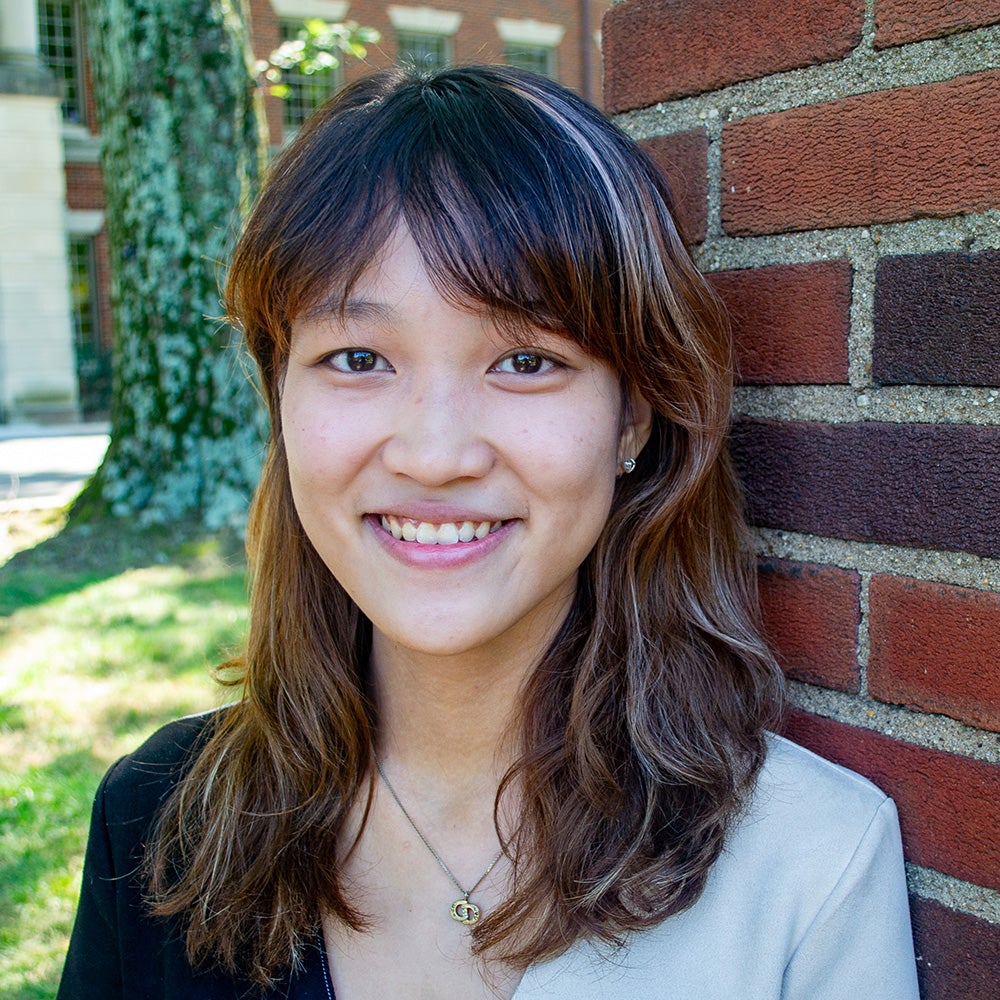
From Taiwan to the United States, Michelle Chien has pursued knowledge through a joint M.D./M.S. program between Fu Jen Catholic University and Georgetown University. Despite her initial uncertainties about pursuing a medical degree, she’s enjoyed the challenges of the programs and the opportunity to experience life in the U.S. She says she’s “always been thinking about the life of becoming an M.D. in the U.S. … and whether I’ll like living in the States.”
During her time in the Tumor Biology M.S. program, she has relished scientific discovery and applying the findings of her research to patient care. “It’s kind of fun that you can bridge the gap between the bench and the bed,” she says.
Seeing how her professors at Georgetown are “enthusiastic about knowledge” is motivating for Michelle. “They still keep themselves updated with the newest findings,” she says.
The program has also given her new insight into technological advantages that can impact health care: “One of my biggest surprises during my study is how advanced bioinformatics are.”
As Michelle prepares to integrate her experiences into her medical training, she emphasizes the importance of seizing opportunities and seeking guidance from mentors. Her time at Georgetown has given her meaningful connections with mentors and peers who have helped to fuel her academic journey. Michelle is confident that the knowledge and experience she has gained thus far will pave the way as she embarks on the next chapter of her journey, determined to “never stop learning.”
Wei-Chi Huang
M.S. in Tumor Biology
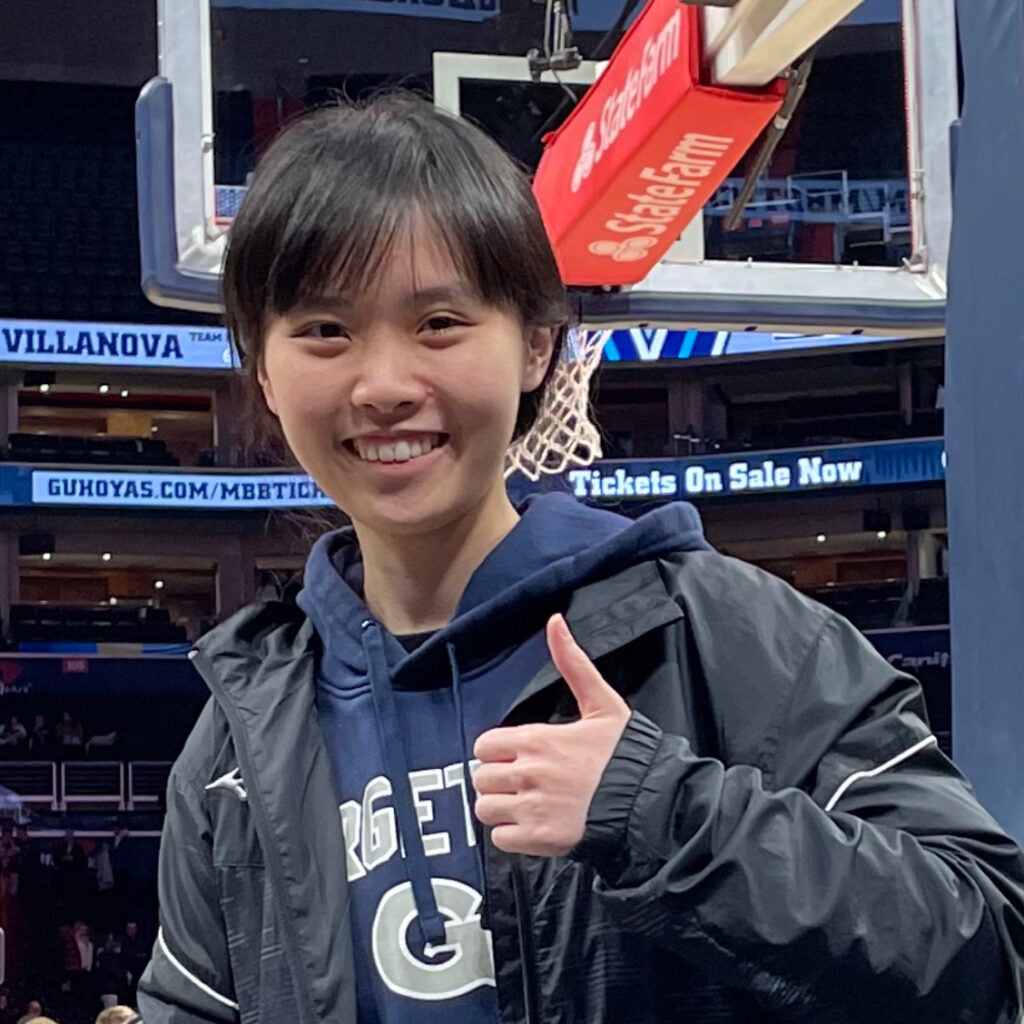
Wei-Chi grew up in Taiwan and pursued medical undergraduate studies at Fu Jen Catholic University in New Taipei City. There, she came to appreciate the “pivotal role of research in advancing medical knowledge” and took an interest in the “complexities” of tumor research.
With the goal of becoming a doctor and researcher, Wei-Chi enrolled in the Fu Jen/Georgetown joint M.D./M.S. program. She writes that the reputation of Georgetown’s M.S. in Tumor Biology made it an “obvious choice” for gaining research experience.
She wasn’t disappointed when she arrived in labs on the Hilltop. She writes: “The laboratory experience here offers a distinct departure from my previous encounters. Individuals exhibit a comprehensive understanding of their experiments, encompassing a broader perspective that I find immensely captivating.”
That “broader perspective” bolsters Wei-Chi as she returns to her medical studies. She writes that her time at Georgetown helped her to become familiar with the mindset and technical skills of an experimenter, with stronger critical thinking skills as well as “a multitude of techniques that undoubtedly will prove invaluable in my future endeavors.”
To future international students, she writes: “Overcoming the language barrier can be one of the greatest challenges. … Yet, with perseverance and belief in oneself, adaptation is inevitable. Enjoy!”
As a researcher, do what it takes and always be optimistic.
Wei-Chi Huang
Kyungji Moon
M.S. in Integrative Neuroscience
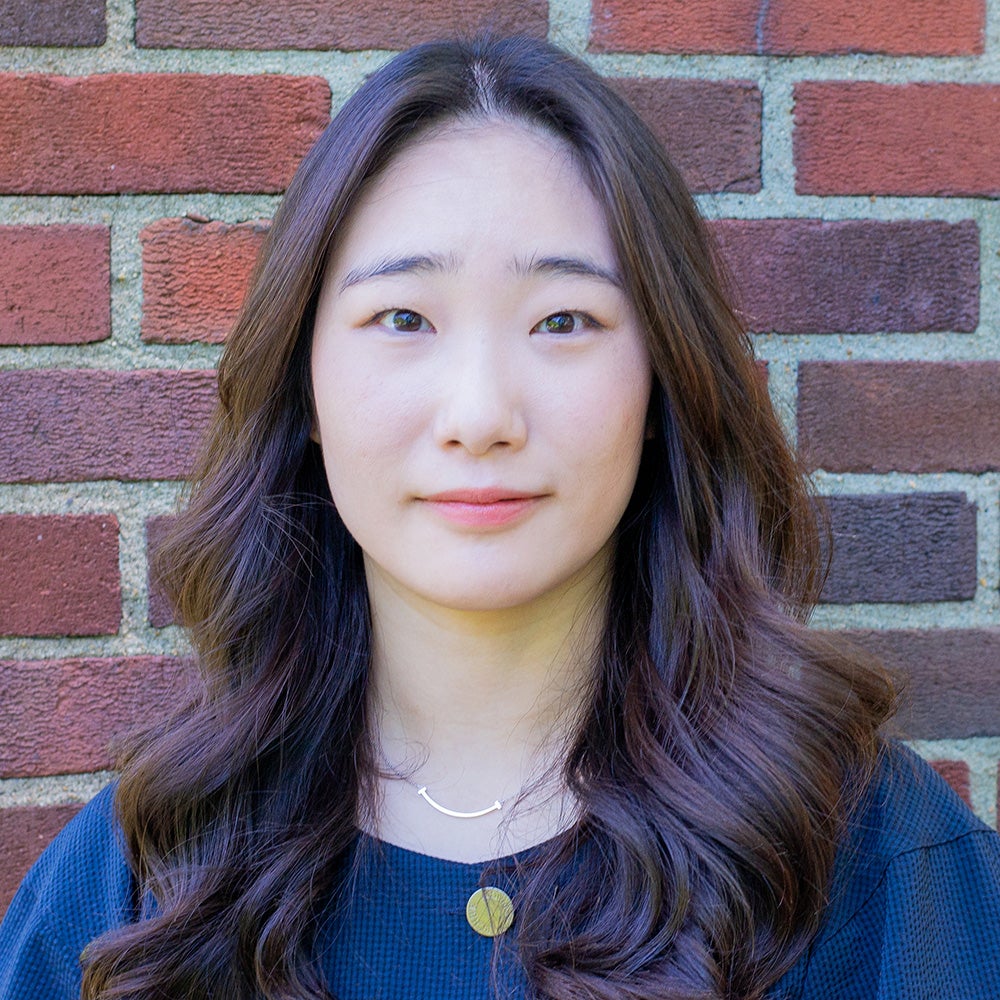
Attending Georgetown from Busan, South Korea, Kyungji has seen her family’s experiences affect her own personal and academic aspirations. Her grandparents, refugees of the Korean War, were able to relocate to Busan with the help of the U.S. Army and global health organizations. This support helped to instill in Kyungji an appreciation for those willing to serve others in need. The challenges faced by soldiers and by people living in poverty ignited Kyungji’s passion for neuroscience, as she recognized its comprehensive approach to addressing mental and physical health challenges.
Before studying neuroscience, Kyungji earned a master’s degree in sports science; however, the pandemic was an inflection point in defining her scientific identity. Driven by her family’s experiences, she decided to pursue a Master’s in Integrative Neuroscience at Georgetown.
While at Georgetown, Kyungji made impactful connections with her principal investigator, other faculty, and peers who helped to motivate, encourage and support her along the way. She found not only academic enrichment but also a supportive community that valued diversity and mutual respect.
As Kyungji prepares for her next chapter, she encourages her fellow international students to make use of the resources offered within their programs and by the university. The career center helped her to navigate the complexities of seeking employment as an international student.
Kyungji’s story is a testament to the transformative power of education and the potential for positive change on a global scale. Through her journey, Kyungji embodies the belief that every individual has the capacity to make a difference and inspire others to do the same.
Ranju Ravindranath
M.S. in Biotechnology
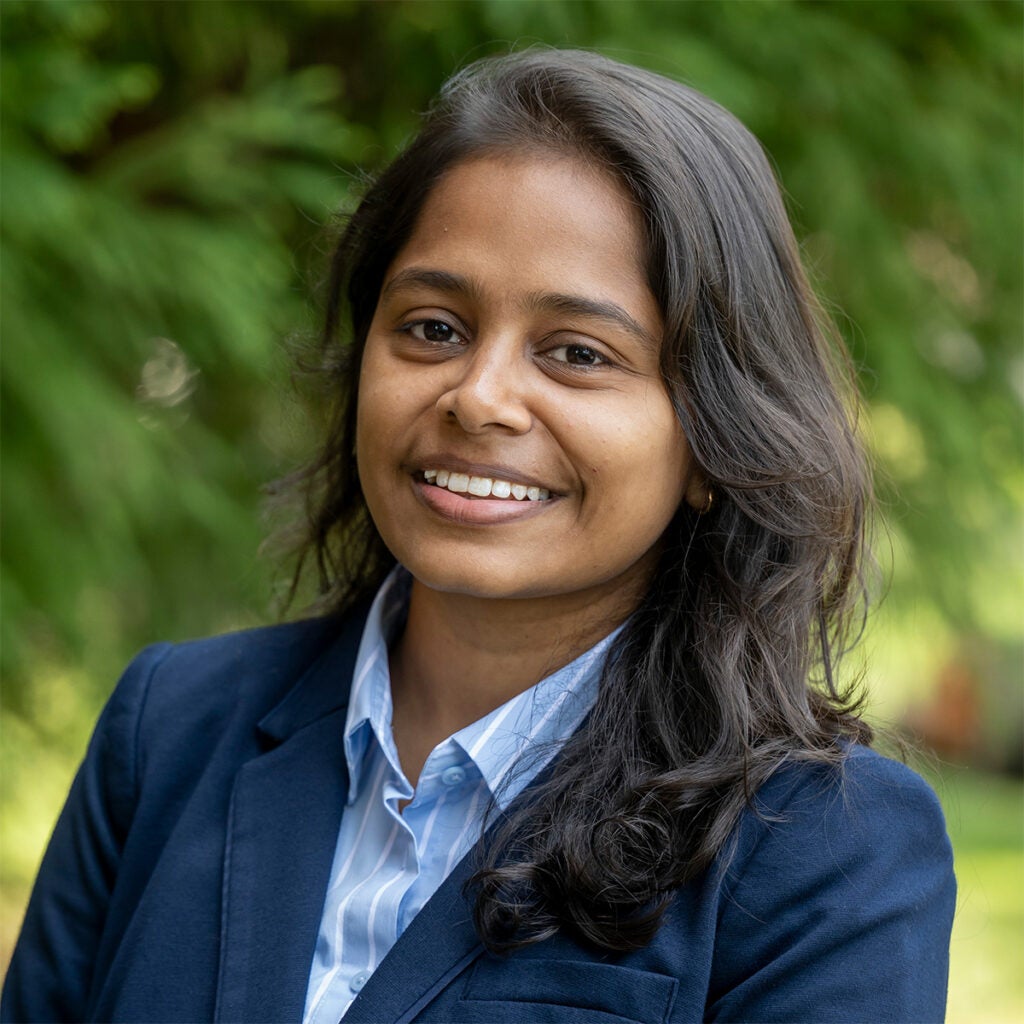
One master’s degree was not enough for Ranju Ravindranath: She had already completed a biotechnology master’s at Sri Venkateswara University (SVU) in India when she applied to the M.S. in Biotechnology at Georgetown.
Coming to the United States was a new challenge, with the “big process” of obtaining a student visa. Ranju had to defer her enrollment to make time for the paperwork, but with assistance from the Georgetown Office of Global Services, she made it to Washington, D.C., to continue her studies.
In Georgetown, Ranju found a place to further develop “both academic and interpersonal skills” in her pursuit of a career in healthcare business. She cites “the art of relationship building” as one of the greatest lessons of her studies.
“Being part of my program, I had a lot of opportunities to interact with a lot of esteemed scientists, CEOs and other professionals from the industry,” Raju says. “This really brought me good networking and relationship building skills.”
To the prospective students: Georgetown is highly diverse and with a wonderful campus culture, it is very resourceful and it [will] shape you to be a better person with both academic and interpersonal skills.
Ranju Ravindranath
Serena Scognamiglio
Ph.D. in Pharmacology & Physiology
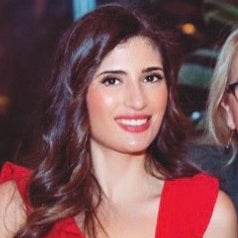
Dr. Serena Scognamiglio’s journey from Naples, Italy, into the neuroscience of aging has been influenced by her family’s history. After witnessing her grandfather’s battle with Alzheimer’s and wishing she could find a cure, Serena developed an interest in pharmaceuticals and neuroscience, leading her to pharmacy school at Università degli Studi di Napoli Federico II and her experimental thesis at the National Institutes of Health.
With her Pharm.D. completed, Serena wanted to continue as a researcher, so she joined a lab at Georgetown University. The experience led her to join the Pharmacology Ph.D. program: “Before falling in love with the program, I fell in love with the school. Georgetown became a little bit my home because I have been there since January 2017.”
While the vibrant Georgetown community was exciting for Serena, she faced challenges familiar to other international students, adapting to being an ocean away from her family and learning in a new language. “It was tough moving [to Georgetown],” she says. “But I’m a friendly and social person, so I found ways to make the transition easier.”
Throughout her Ph.D. program, she engaged with and developed community by joining the Language Exchange group, serving as a congressional science policy fellow for the American Society for Pharmacology and Experimental Therapeutics, and representing her fellow Pharmacology Ph.D. students as the liaison to program faculty. Her thesis research “was all about aging, and how we can prevent cognitive impairment during aging.”
Looking to the future, Serena is drawn to the intersection of pharmaceuticals and business and is currently an account manager at Procter & Gamble. Her time at Georgetown has not only equipped her with the necessary scientific knowledge, but also has honed her problem-solving and critical thinking skills, preparing her for the challenges ahead.
As she embarks on the next chapter of her journey, Serena reflects on the invaluable lessons she’s learned at Georgetown. Above all, she emphasizes the importance of being considerate and compassionate, urging fellow international students to “not isolate themselves” and to “make friends outside of your master’s or Ph.D. program.”
Congratulations to all of our biomedical graduates!
We invite you to visit our Alumni page to find out how you can take advantage of BGE resources and stay connected with the BGE community after graduation.

